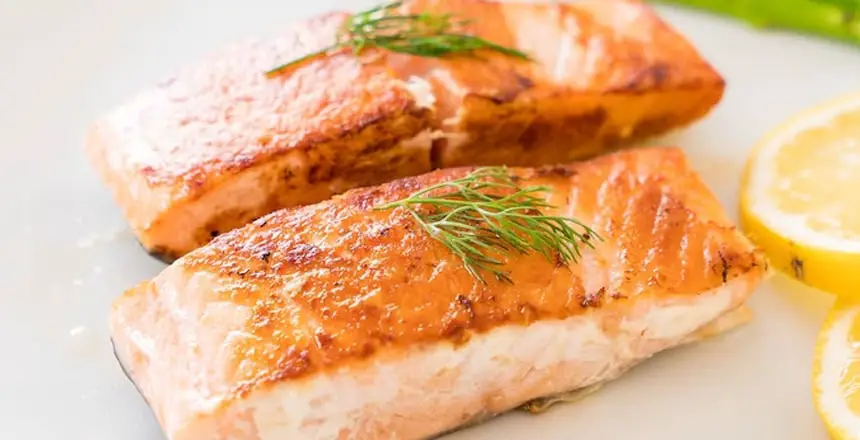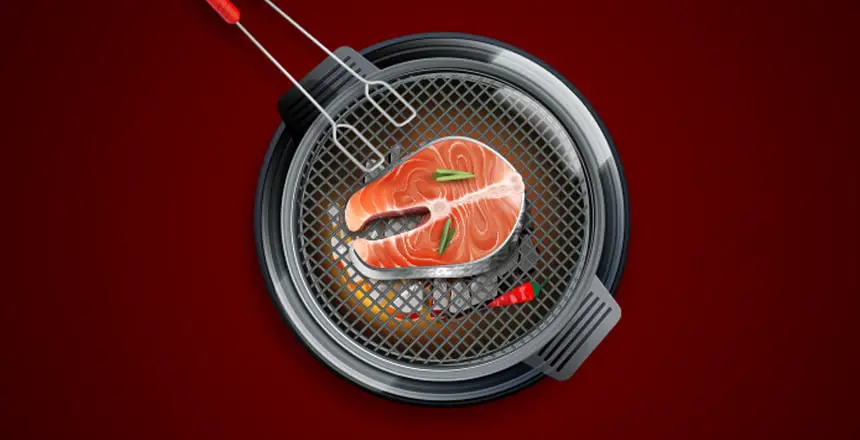Perfectly done salmon is a culinary masterpiece. Its juicy and tender flesh is supposed to break apart effortlessly and dissolve on your tongue. But when you venture into the territory of overcooked salmon, all the symphony of flavors goes for a toss. Hence, the perfect baked salmon temperature, which is between 120 and 125 degrees Fahrenheit.
The internal temperature plays a huge role when cooking salmon or any other kind of seafood or even meat. Bake times vary from one type of food to another and even from one oven temperature to the other. So here’s all you need to know about how to coax the most delightful and delectable qualities from not just whole salmon but also salmon fillets.
Related:
- How Long to Cook Salmon Patties
- How Long Does It Take To Bake Salmon At 425
- How Long Does It Take To Bake Salmon At 350
- How Long Does It Take To Bake Salmon at 400
- How to Cook Salmon in the Oven
Contents
- Proper Baked Salmon Temperature
- Salmon Cooking Time
- How to Find Out When Salmon Is Done
- Frequently Asked Questions About Cooking Salmon (FAQs)
- Is It Better to Cook Salmon at a High or Low Temperature?
- Why Is 125 Degrees Fahrenheit Better for Cooking Salmon?
- Can You Cook Salmon at a Temperature Below 125 Degrees Fahrenheit?
- What Temperature Is Best for Stove-Cooking Salmon?
- What Happens If You Overcook Salmon?
- Is It Better to Bake Salmon at 350 or 400 Degrees Fahrenheit?
- Can You Bake Salmon at 135 Degrees Fahrenheit?
- Should Salmon Be Cooked to 165 Degrees Fahrenheit?
- Conclusion
Proper Baked Salmon Temperature
There are three different answers to what is the correct baked salmon temperature.
1. The FDA recommends that you cook salmon till its thickest part touches 145 degrees Fahrenheit (this is fully cooked salmon).
2. Many cooking magazines have chosen 125 degrees Fahrenheit to be the most preferred temperature for making sure your salmon become firm and silky. This applies to farmed salmon. Whereas wild salmon’s baking temperature is 120 degrees Fahrenheit. In this case, the temperature is comparatively lower because the salmon here is leaner and also more susceptible to drying out.
3. According to at-home chefs, salmon must be cooked till its flesh becomes dry so it’s easy to cut using a steak knife.
There’s no one right answer to what is the proper baked salmon temperature but 135 degrees Fahrenheit is considered to be the best temperature for consistent results.
But the temperature can vary depending on your personal preferences associated with its “doneness.”
- Well Done, Fully Cooked Salmon: >145 degrees Fahrenheit.
- Medium Salmon: Between 135 and 140 degrees Fahrenheit.
- Medium-Rare Salmon: Between 125 and 130 degrees Fahrenheit.
- Rare Salmon: <120 degrees Fahrenheit.
Salmon Cooking Time
How thick and big is the salmon or its individual fillets?
- Smaller and thinner fillets tend to cook faster than larger and thicker fillets.
Also, wild salmon will cook more quickly in comparison to farmed salmon since the former contains less fat.
So you see how the cooking or baking time is based on the thickness and size of the salmon!
How to Find Out When Salmon Is Done

Using a Thermometer
The most effective and reliable method to know when the salmon is done involves the use of a digital thermometer (this instant-read version). With an invaluable tool like this with you in your kitchen, you can almost always prevent the overcooking of fish as well as meat (or even banana bread!).
How you’re supposed to use it is first to insert its tip into the salmon’s thickest part. The tip of the thermometer should reach the center and must not come in contact with the pan.
Without Using a Thermometer (Using a Fork Instead)
Don’t have a fancy digital, instant-read thermometer? That’s alright because you can simply use a fork for the job. Just gently press down on the flesh of the salmon fillet. Does it easily separate? If yes, your salmon is done!
You can also have a look at the center of the salmon. The inside of the fish is not supposed to look raw anymore.
Although it’s best to use a thermometer to find out when salmon is cooked and ready to be savored.
Frequently Asked Questions About Cooking Salmon (FAQs)
Is It Better to Cook Salmon at a High or Low Temperature?
The coiling of proteins in salmon happens more slowly when a lower temperature is maintained. This helps with maximum oil and moisture retention, which is perfect for that melt-in-the-mouth texture.
On the other hand, cooking at a higher temperature will lead to the liquid protein getting eliminated. Thus, drying out your salmon.
Why Is 125 Degrees Fahrenheit Better for Cooking Salmon?
Because, at 125 degrees Fahrenheit, the salmon does not dry out. Therefore, it still has a rich amount of moisture, which ensures a flaky, soft texture.
Can You Cook Salmon at a Temperature Below 125 Degrees Fahrenheit?
In the case of rare salmon, you can cook it under 120–125 degrees Fahrenheit.
What Temperature Is Best for Stove-Cooking Salmon?
On the stove, the cooking temperature at first (for searing) should be 425 degrees Fahrenheit. After searing it for a minute, lower the temperature to 400 degrees Fahrenheit for cooking each side.
What Happens If You Overcook Salmon?
Nobody likes overcooked salmon because it tastes dry and chalky. You know your salmon is overcooked when it starts to look opaque orange and becomes super firm.
Is It Better to Bake Salmon at 350 or 400 Degrees Fahrenheit?
Now that depends on your personal preferences. If you bake at 400 degrees Fahrenheit, the salmon will get crispy. But to keep things on the milder side, baking at 350 degrees is perfect.
Can You Bake Salmon at 135 Degrees Fahrenheit?
For medium salmon, you’re supposed to keep the baking temperature between 135 and 140 degrees Fahrenheit. To make it well done, 145 degrees Fahrenheit or higher. And for medium-rare salmon, the temperature should be between 125 and 130 degrees Fahrenheit.
Should Salmon Be Cooked to 165 Degrees Fahrenheit?
The FDA highly recommends cooking salmon to 145 degrees Fahrenheit. The internal temperature of the thickest part of the salmon should reach 145 degrees Fahrenheit for the fish to be acceptable and safe to eat.
Conclusion
What’s a dish that’s both easy to make and fancy at the same time? Baked salmon of course!
But you can easily overcook it if you don’t know the proper baked salmon temperature. However, you don’t need to worry about that anymore!
Just make sure to avoid overcooking by using foil or parchment paper. You can also select thicker fillets as these don’t overcook that easily. Also, wild salmon, in comparison to farmed salmon, has more fat, thus more moisture.
